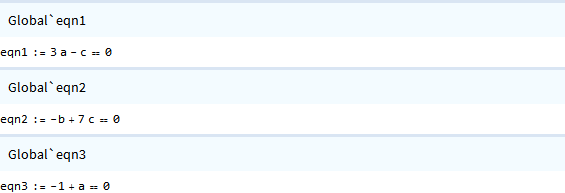So this is similar to this.
Suppose I have an equation $ax^2-bx+3a-c-2x^2+7cx+x^2=0$
I can group the terms in mathematica using
eq = a*x^2-b*x+3*a-c-2*x^2+7 c*x+x^2
neweq = Collect[eq,x]
to get $x^2(a-1)+x(7c-b)+3a-c$
Here's the tricky bit. How can I save all the coefficients of this equation as new equations that equal zero and save them as variables. For small equations I'd just copy paste but when it gets to higher order say $x^{70}$ it's much faster to automate.
e.g.
eq1:= a-1==0
eq2:= 7c-b==0
eq3:= 3a-c==0
I can then use Eliminate to solve for a,b and c
e.g.
Eliminate[{eq1,eq3},c]
will solve for a.
Not only will this benefit me, but anyone in the community who deals with Lie Symmetries that needs to separate equations with regards to various variables, especially derivatives.
I know loops need to be included somehow to count for eq1,eq2 etc etc but how to separate and save is too far outside of my Mathematica expertise.
Many Thanks


